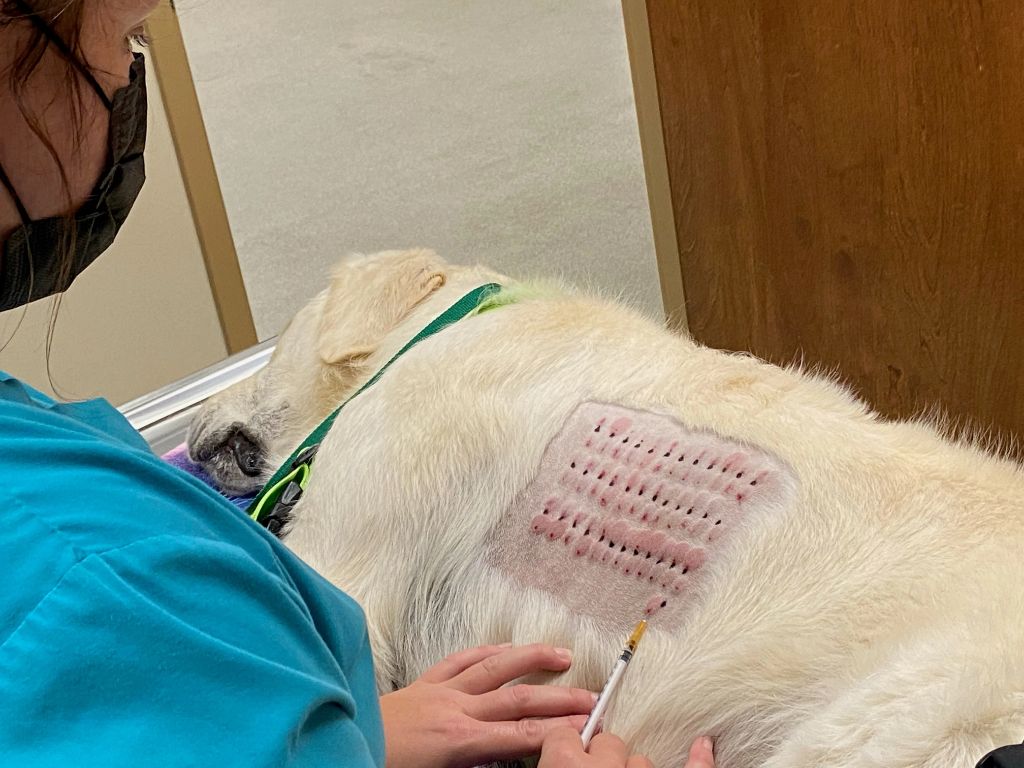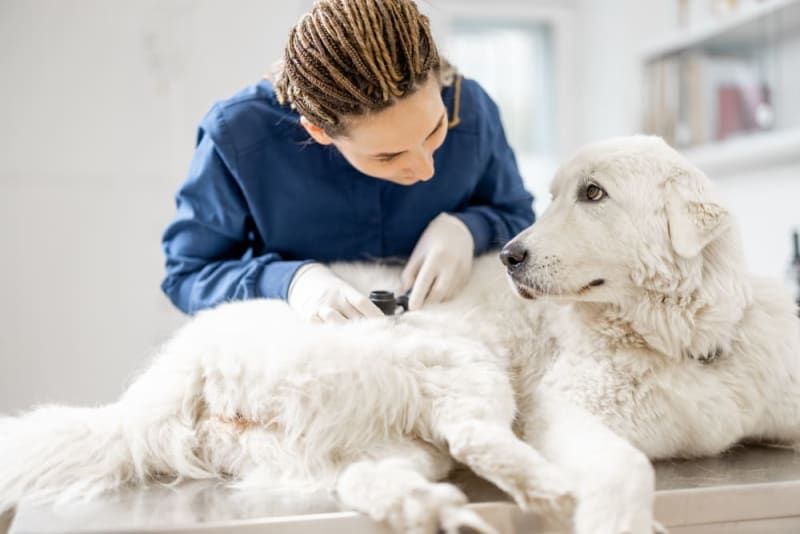What Are Grass Allergies in Dogs?
Grass allergies in dogs, also known as pollen allergies, occur when a dog’s immune system overreacts to grass pollens in the environment (Mueller, 2016). Grass pollen allergies are one of the most common causes of allergic reactions in dogs.
Common symptoms of grass allergies in dogs include itchy skin, ear infections, sneezing, watery eyes, scratching, and chewing at the paws. These symptoms often worsen seasonally in the spring and summer when grass pollens are highest, but some dogs can react year-round (Jensen-Jarolim, 2015).
The underlying cause is the dog’s immune system mistakenly identifying grass pollens as a threat. This triggers the release of antibodies that then cause an allergic response upon subsequent exposures. Grass pollens are light and easily dispersed by wind, making them very prevalent in a dog’s environment (North Hill Vet, 2018).
Diagnosing Grass Allergies
Veterinarians will conduct a thorough exam to rule out other conditions like skin infections or flea allergies that could cause similar symptoms. They will also review the dog’s full medical history and the timing of symptoms. If the exam and history point to grass allergies, vets have a few options for confirming the diagnosis:
Allergy testing like intradermal or serum IgE tests analyze the dog’s reaction to specific allergens. These tests can identify exactly which grasses or pollens trigger an allergy response. Intradermal testing injects small amounts of allergen extract into the skin whereas serum IgE tests analyze a blood sample. According to veterinary dermatologists, allergy tests can cost $200 to over $500. https://cennutrition.com.au/grass-allergy-in-dogs/

An elimination diet trial removes all sources of carbohydrates like grains and starchy vegetables. If symptoms improve, carbohydrates are gradually reintroduced one at a time to identify the problematic ingredients. This approach is lower cost but time consuming. https://www.vetniquelabs.com/blogs/vets-corner/is-my-dog-allergic-to-grass-vetnique
Conventional Treatments
There are several conventional treatment options for dogs with grass allergies:
Allergy Shots
Allergy shots, also known as allergen immunotherapy, can help desensitize dogs to grass allergens over time. According to PetMD, allergy shots involve injecting small amounts of the allergen into the dog to get their immune system used to it. The dosages are gradually increased over several months. Allergy shots can significantly reduce allergy symptoms in 60-80% of dogs.
Antihistamines
Antihistamines like diphenhydramine (Benadryl) and hydroxyzine can help block histamine release and reduce itching. According to DuraLawn, antihistamines work best when given prior to allergen exposure. Consult a vet on proper antihistamine dosage for your dog.
Topical Therapies
Topical ointments, sprays, and shampoos can provide relief when applied to irritated skin. Friends of the Dog recommends oatmeal and aloe vera sprays to soothe skin inflammation and discomfort from grass allergies.
Apple Cider Vinegar for Dogs
Apple cider vinegar (ACV) is made from fermented apple juice and contains acetic acid and essential nutrients like potassium and enzymes. Some pet owners use ACV as a nutritional supplement for dogs due to its potential health benefits. According to Chewy, possible benefits of apple cider vinegar for dogs include:
- Improving skin and coat health
- Treating ear infections
- Repelling fleas
- Aiding digestion
However, more research is still needed to fully understand the effects of ACV on dogs. Always check with your veterinarian before giving your dog any new supplements.
The proper dosage of ACV depends on the size of your dog. Most experts recommend starting with 1 teaspoon per day for small dogs, 1-2 tablespoons for medium dogs, and 1-2 tablespoons twice a day for large dogs. ACV can be mixed into your dog’s food or water. When introducing ACV, start with small amounts and gradually increase to the full dosage over several days to allow your dog’s stomach to adjust.
It’s important to only use raw, unfiltered apple cider vinegar that contains the “mother.” This sediment contains the majority of ACV’s nutrients and probiotics. Do not use any ACV that has been filtered or pasteurized. Dilute ACV before giving it to your dog, as the acidity can harm their mouth and esophagus if given undiluted. Mix 1-2 teaspoons of ACV into 1 cup of water.
Using Apple Cider Vinegar for Grass Allergies
Some dog owners have reported successful use of apple cider vinegar (ACV) for treating grass allergies in dogs. The possible benefits are thought to come from ACV’s acetic acid content, which may have anti-inflammatory effects and help relieve allergy symptoms (source).

However, evidence for using ACV for dog allergies is mostly anecdotal at this point. Owners have shared positive experiences giving ACV internally or externally, reporting improvements in symptoms like itchy skin, ear infections, and watery eyes. But more research is still needed on the effectiveness and proper dosing of ACV (source).
It’s best to consult your veterinarian before giving ACV to your dog, especially if they are on other medications or have certain health conditions. Under veterinary guidance, ACV may be a helpful supplementary treatment, but likely works best alongside other allergy management strategies recommended by your vet.
Apple Cider Vinegar Dosage
When giving apple cider vinegar to dogs for grass allergies, it’s important to administer the proper dosage based on your dog’s weight. According to experts, the general guideline is:
- Small dogs (under 25 lbs): 1/4 teaspoon to 1 teaspoon per day
- Medium dogs (25-75 lbs): 1 teaspoon to 1 tablespoon per day
- Large dogs (over 75 lbs): 1 to 2 tablespoons per day
To administer apple cider vinegar, simply mix the proper dosage into your dog’s food or water. Most dogs don’t mind the taste. However, if your dog is a picky eater, try mixing it into wet food or broth to mask the flavor. Shake or stir well to distribute the vinegar evenly before serving.
It’s best to start with smaller amounts of apple cider vinegar and monitor your dog’s reaction. Gradually increase to the recommended dosage over a few days. This allows your dog’s system to adjust to the addition.
Consistency is key when giving apple cider vinegar for allergies. Make sure to administer it daily with meals to maintain a therapeutic level in your dog’s system. Avoid giving it undiluted, as the acidity can harm your dog’s throat and teeth.
Safety Considerations
While apple cider vinegar can provide relief for dogs with grass allergies, it’s important to monitor your dog for any side effects. Some potential side effects include:
- Upset stomach or diarrhea, as ACV can cause gastrointestinal issues in some dogs
- Damage to tooth enamel if administered incorrectly
- Throat irritation if not diluted properly
It’s also key to remember that apple cider vinegar is not a cure-all for grass allergies in dogs. While it may help provide symptomatic relief and support your dog’s immune system, ACV does not treat the underlying cause of the allergy. For long-term management, you’ll still need to work with your veterinarian on diagnostics and possible allergy shots or medications.
Keep a close eye on your dog when starting apple cider vinegar and stop use if any worrisome symptoms develop. ACV should complement, not replace, conventional veterinary allergy treatment when needed.
Other Natural Approaches
In addition to apple cider vinegar, there are some other natural remedies that may help relieve grass allergies in dogs:
Omega-3 Fatty Acids
Omega-3 fatty acids like those found in fish oil have anti-inflammatory properties that can help reduce allergy symptoms. Omega-3s help stabilize cell membranes and block some of the inflammatory chemicals that are released during an allergic response. Talk to your vet about supplementing your dog’s diet with omega-3s.
Probiotics
Probiotics may help regulate the immune system and reduce allergic reactions. Look for a high-quality probiotic supplement made specifically for dogs. Give probiotics on a consistent basis, not just when allergy symptoms flare up.
Allergen-Specific Immunotherapy
Allergen-specific immunotherapy works like a vaccine for allergies. Your dog is exposed to tiny amounts of the allergen in order to build up tolerance over time. This is typically administered through allergy shots. Discuss this option with your veterinarian to see if it could be beneficial for your dog.
Lifestyle Changes
Making some adjustments to your dog’s lifestyle can help minimize their exposure to grass allergens and reduce allergy symptoms. Here are some tips:
Wipe your dog’s paws with a damp towel or pet wipes whenever they come inside after being outside in the grass. This will remove any grass pollen that may be clinging to their fur and paws (source).

Use a HEPA air filter in your home. HEPA filters are highly effective at removing allergens like grass pollen from the air. This can create a cleaner indoor environment for your dog (source).
Avoid allowing your dog to spend time laying in grassy areas. Opt for pavement or dirt areas when outside. You may also consider replacing grass areas in your yard with artificial turf (source). This reduces contact with the allergen source.
When to See a Veterinarian
You should take your dog to the veterinarian if they have a severe reaction to grass or persistent allergy symptoms that do not improve with natural remedies or lifestyle changes. Signs that warrant a trip to the vet include:
- Extreme itching, licking, biting, or scratching at their skin
- Excessive sneezing or coughing
- Watery eyes and runny nose
- Swelling around the face and muzzle
- Hives, welts, or rash on their belly or paws
- Vomiting or diarrhea
- Trouble breathing or increased effort breathing
Your veterinarian can properly diagnose the grass allergy through skin or blood testing. They can provide medications like steroids or allergy shots to quickly reduce symptoms and discomfort. The vet may also recommend trying immunotherapy or allergy desensitization. This gradual exposure therapy can make dogs less sensitive to grass over time.

It’s important to contact your vet if allergy symptoms persist for over 2 weeks despite home treatment. They can evaluate your dog’s skin for any secondary infections that may develop and provide prescription medications for relief. Don’t delay visiting the vet if your dog has a life-threatening reaction.
